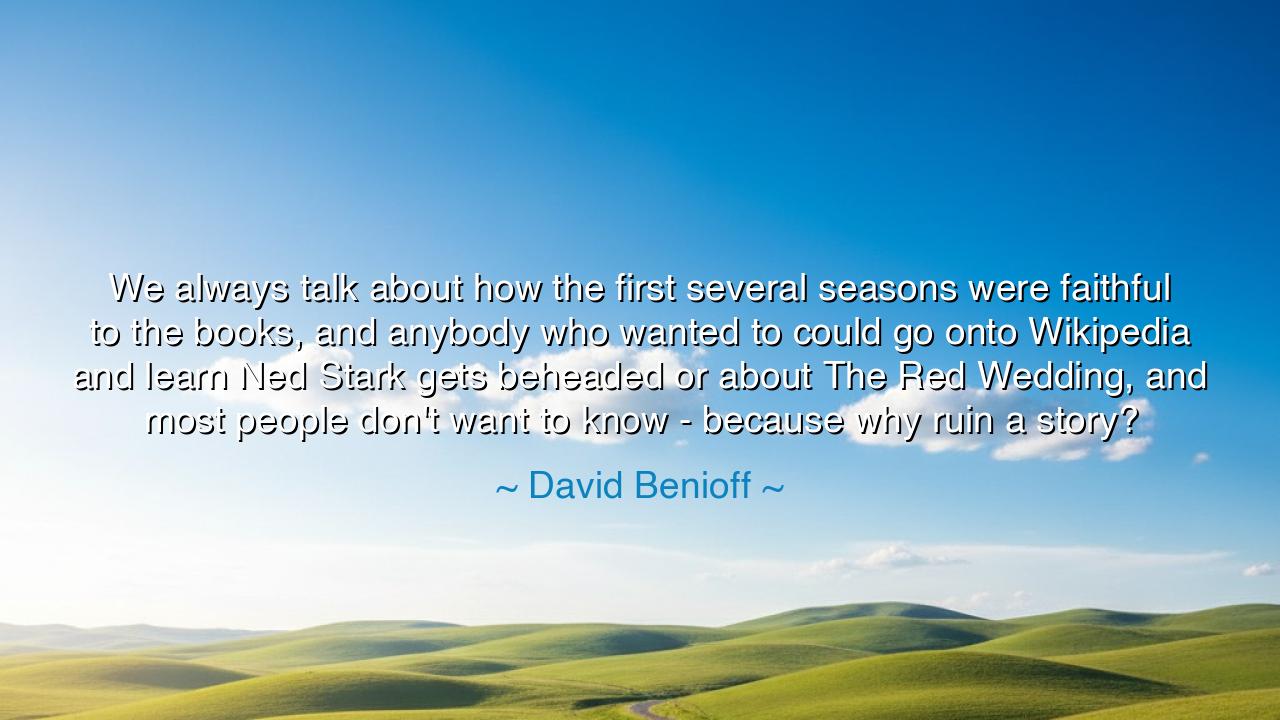
We always talk about how the first several seasons were faithful
We always talk about how the first several seasons were faithful to the books, and anybody who wanted to could go onto Wikipedia and learn Ned Stark gets beheaded or about The Red Wedding, and most people don't want to know - because why ruin a story?






In the words of David Benioff, we hear the meditation of a storyteller on the sacred bond between narrative and wonder. He speaks of the first seasons of his tale, faithful to the books, where those who hungered for knowledge could easily turn to chronicles such as and learn in advance of Ned Stark’s beheading or the horror of The Red Wedding. Yet he notes that most chose not to seek such knowledge, for they understood the deeper truth: that to unveil the future is to ruin the story, to rob oneself of the awe, the shock, the grief, and the triumph that only comes when fate is encountered in its proper hour.
The ancients knew well this reverence for mystery. In the theaters of Athens, though the people knew the myths of Oedipus or Agamemnon, they came not to spoil the tale but to feel it anew, as if for the first time. For it is not only the ending that matters, but the journey, the dread of the moment before, the trembling of the soul as the tragic fate unfolds. Just so, those who abstain from foreknowledge honor the sacred rhythm of the story, allowing it to strike their hearts as lightning strikes the sky.
His words remind us that knowledge without timing is a burden, not a gift. To know that Ned Stark must die before seeing him live and breathe diminishes the sorrow; to learn of The Red Wedding without walking with the characters who will be slain empties the shock of its weight. A story unfolds like life itself—step by step, moment by moment. To leap ahead is to miss the meaning that only comes with patience.
History too gives its lesson. When the Oracle of Delphi revealed to Croesus that if he waged war he would destroy a great empire, his pride made him blind to the meaning. He sought knowledge without wisdom, and thus destroyed his own kingdom. In this we see the danger of premature revelation: to know the outcome without context is to misjudge its power. The wise allow the tale to teach them in its proper order.
Therefore, let it be remembered: a story is a living thing, and to rob it of its unfolding is to wound its soul. The shock of betrayal, the fall of heroes, the triumph of love—these must be experienced, not catalogued. Benioff’s words are a reminder to all who listen: resist the temptation to pierce the veil before its time. For the truest wisdom of a tale lies not in its ending, but in the journey through mystery, grief, and wonder that leads us there.






AAdministratorAdministrator
Welcome, honored guests. Please leave a comment, we will respond soon